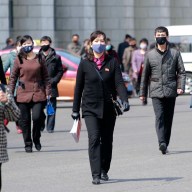 Dee and Scott McGrath outside their home in New Dorp Beach, Staten Island. They have been subjected to numerous anonymous and unsubstantiated 311 complaints.
Dee and Scott McGrath outside their home in New Dorp Beach, Staten Island. They have been subjected to numerous anonymous and unsubstantiated 311 complaints.
Credit: Miles Dixon/Metro
One of the first complaints against Scott McGrath’s property last year came six months after Superstorm Sandy nearly destroyed his New Dorp Beach home on Staten Island.
Entered on April 28, 2013, the complaint cited excessive debris at McGrath’s Roma Avenue house, according to Department of Building records.
“We were still cleaning up after Sandy,” McGrath, 46, said nearly a year later. “And we get a phantom call about garbage on my property? Come on.”
An inspector later ruled that the complaint was unwarranted, but McGrath’s property has continued to be cited for numerous unsubstantiated building violations, from construction without a permit to illegal conversion. McGrath said he believes a neighbor who once threatened him is using 311, the city’s non-emergency call service, as a tool for harassment.
“We keep getting these anonymous calls,” said McGrath, who lives with his wife. “We’re going insane.”
Councilman Steven Matteo said McGrath, one of his constituents, is not alone. Since 2006, when Matteo became chief of staff to his predecessor, current Staten Island Borough President Jimmy Oddo, his district office has recorded over 50 cases of residents like McGrath who are being subjected to 311 “harassment.”
“It gets to the point where it’s ruining some people’s lives,” Matteo said. One constituent who recently approached him broke down in tears because she couldn’t afford to move from a property that received a number of anonymous complaints.
A City Council bill introduced by Matteo last month aims to end such “neighbor-versus-neighbor” 311 disputes.
Under the measure, which has bipartisan support from five other co-sponsors, a property like McGrath’s would be ruled the subject of harassment upon receiving three or more baseless 311 complaints within six months. For three months after that, the 311 customer service center would only document non-emergency calls about the property without referring them to a city agency.
The law would apply to any property occupants who are the subject of repeat anonymous 311 calls — be it homeowners, renters or leasers — according to Matteo’s office. Though McGrath has struggled with buildings calls, the law would also apply to other potential 311 complaints, like noise or mold.
Matteo said other council members told him that they have had similar issues with 311, but that the reports of harassment seem to be exacerbated in places like Staten Island, where there are more one- and two-family residences.
“Then there’s going to be neighbor-versus-neighbor disputes. That’s just human nature,” he said.
Matteo’s solution, he said, wouldn’t limit “legitimate” calls to 311, which is used to report everything from relentless dog barking to potholes. The bill only targets uncorroborated anonymous calls.
“Any call where someone wants to leave their contact information — this doesn’t affect them at all,” he added.
If complaints against McGrath’s home continue at the same rate under the new law, his property would be considered harassed.
Five complaints against his home were logged on April 28 and 29 last year alone, according to city records. Including the call about debris, four were deemed unsubstantiated after an inspection. Just one — a complaint about electrical wiring — warranted a notice of deficiency because of water damage from Sandy.
His property received nine total complaints in 2013, with seven deemed baseless upon inspection. In addition to the wiring call, two apparently legitimate calls include a complaint that was closed after McGrath wasn’t home for an inspection.
McGrath said part of the hassle is that he must be home for inspections, which are often during work hours.
“They threaten to get warrants to open up my house — who needs that?” said McGrath, who works at Con Edison.
Matteo said the calls can also waste city resources, with police officers, building inspectors and other agency employees investigating bogus complaints.
“It clogs up the system,” he said.
A spokeswoman said it is the policy of 311 not to comment on proposed legislation. After introduction, the bill was referred to the Committee on Governmental Operations, chaired by Upper East Side Councilman Ben Kallos, who declined to comment through a spokeswoman.
Even if the legislation doesn’t pass, Matteo hopes to start a discourse about 311 policy with hearings on the bill. “If someone has issues with it, let’s hear it,” he said.
McGrath said he hopes the bill, if passed, will eventually stop the complaints and ease his family’s Sandy recovery. He said several others in the neighborhood also hit hard by the storm have been fielding similar 311 complaints.
“People are trying to get their lives back together,” he said. “They shouldn’t be harassed; thats’s the bottom line.”
Follow Anna Sanders on Twitter @AnnaESanders











